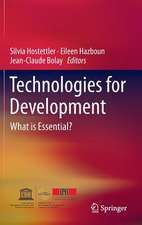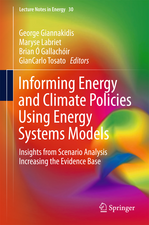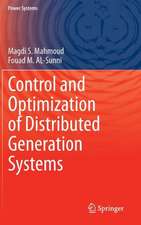Sustainable Electricity II: A Conversation on Tradeoffs
Editat de Jessica Fox, Morgan Scotten Limba Engleză Paperback – 2 feb 2019
- Realities of power company choices, regulatory boundaries, and stakeholder approvals.
- Expectations of the responsible investor, environmental advocate, and Silicon Valley companies including Google, Facebook, and Stanford University.
- Surprising stories show how creativity, innovation, and planning can resolve some of the toughest choices facing electric power companies today, although not in all cases.
“People have been able to fish, hike, camp and boat on a beautiful AEP property that supports recreational activities for many years. Now AEP has to generate income from this property. Do we build roads and drill to extract the natural gas? Do we sell the timber and keep the property? Do we sell the whole thing? What about the fish, deer and other wildlife? Tradeoffs will be made, and not everyone will like them.”
Tim W. Lohner, Ph.D., Environmental Specialist, American Electric Power. (Chapter 3)
“Companies are demanding access to clean energy and investors are pressing companies to source 100% renewable. It is essential that utilities develop a comprehensive strategy to reduce climate impact, and clearly articulate the plan and their progress. Customers and investors want to see this progress, and utilities need to develop the right model for their particular business.”
John Streur, CEO, Calvert Research & Management (Chapter 4)
“At Chevron, we are continually examining the tradeoffs as we work to improve our energy efficiency and reduce our environmental footprint. The complexity of our global, shared challenge to electrify the world without undue compromise to the integrity of our planet is one that will require global action. The experiences and perspectives detailed in this book are important to understand as we collectively work towards a sustainable energy future. The one billion plus are counting on us.”
Kirsten S. Thorne, Global Issues and Public Policy Manager, Chevron (Forward)
| Toate formatele și edițiile | Preț | Express |
|---|---|---|
| Paperback (1) | 725.13 lei 6-8 săpt. | |
| Springer International Publishing – 2 feb 2019 | 725.13 lei 6-8 săpt. | |
| Hardback (1) | 731.10 lei 6-8 săpt. | |
| Springer International Publishing – noi 2018 | 731.10 lei 6-8 săpt. |
Preț: 725.13 lei
Preț vechi: 884.30 lei
-18% Nou
Puncte Express: 1088
Preț estimativ în valută:
138.80€ • 150.82$ • 116.67£
138.80€ • 150.82$ • 116.67£
Carte tipărită la comandă
Livrare economică 21 aprilie-05 mai
Preluare comenzi: 021 569.72.76
Specificații
ISBN-13: 9783030070847
ISBN-10: 3030070840
Pagini: 241
Ilustrații: XX, 241 p. 82 illus., 81 illus. in color.
Dimensiuni: 155 x 235 mm
Greutate: 0.37 kg
Ediția:Softcover reprint of the original 1st ed. 2019
Editura: Springer International Publishing
Colecția Springer
Locul publicării:Cham, Switzerland
ISBN-10: 3030070840
Pagini: 241
Ilustrații: XX, 241 p. 82 illus., 81 illus. in color.
Dimensiuni: 155 x 235 mm
Greutate: 0.37 kg
Ediția:Softcover reprint of the original 1st ed. 2019
Editura: Springer International Publishing
Colecția Springer
Locul publicării:Cham, Switzerland
Cuprins
Chapter1: Introduction: The Tradeoff Conversation for Sustainable Electricity.- Chapter2: Achieving Balance: Ameren’s Corporate Social Responsibility Reporting Journey.- Chapter3: Reclaiming Value from Former AEP Mine Lands: Balancing Economic and Environmental Benefits.- Chapter4: Sustainable Electric Power from a Responsible Investing Perspective.- Chapter5: Exelon Driving Innovation and the Grid of the Future.- Chapter6: A Regulatory Perspective on Transforming the Power Sector.- Chapter7: The Third "E": LADWP's Commitment to Equity Ensures First Rate Service to All.- Chapter8: Portland General Electric Driving Collaboration for Sustainable Legislation.- Chapter9: Silicon Valley Customer Expectations: Resilience and Innovation in a Changing Climate.- Chapter10: Santee Cooper’s Coal Ash Impoundment Closure Challenge: Risk Reduction through Recycling.- Chapter11: Creating Success for TVA through Sustainable Solutions and Customer Collaborations.- Chapter12: Do We Need Trade-offs to Advance Climate Policy?.
Notă biografică
Jessica Fox, EPRI
Fox is a Senior Program Manager at the Electric Power Research Institute (EPRI), where she manages EPRI’s $15 million Water & Ecosystems research area. She is an expert in environmental markets and “credit stacking,” ecosystem services, and corporate sustainability. Fox created the EPRI Ohio River Basin Water Quality Trading Project, which is the world’s first interstate trading program for nutrients and won the United States Water Prize in 2015. Fox led EPRI’s Energy Sustainability Interest Group from 2011 through 2016 to become the largest collaborative forum in the industry to strategically advance critical issues related to the sustainable generation and distribution of electricity, including consensus by 45 utilities on sustainability metrics to use to benchmark their companies’ performance. Fox launched EPRI’s internal corporate social responsibility program in 2016 under EPRI’s Chief Sustainability Officer and CEO, with oversight from EPRI’s Board of Directors. In 2017, Fox was recognized as 'Top Innovator' (The Fantastic Forty) by Public Utilities Fortnightly. In 2018, Fox launched the Power-in-Pollinators Initiative, which is set to be the largest effort in North America focused specifically on pollinator conservation at electric power companies. Her projects have been covered by the Wall Street Journal, The Economist, National Public Radio, Bloomberg, and others. She is a trained meeting facilitator and conflict resolution mediator, a member of the United States Ecological Society of America, and a Certified Habitat Steward by the National Wildlife Federation. Prior to EPRI, she worked as a molecular biologist leading conservation genetics projects on dragonflies in Costa Rica, at Stanford University sequencing and mapping the human genome, and as a manager at a biotech company developing DNA analysis technologies. She has a Bachelor’s of Science degree from the University of California, Davis, and a Master’s of Science degree from Stanford University.
Morgan Scott, EPRI
Scott is a Senior Sustainability Technical Lead at the Electric Power Research Institute (EPRI). In this role, Scott leads EPRI’s growing portfolio of sustainability research, focused on developing the tools and resources electric power companies can use to establish and enhance their sustainability programs as well as embed a triple bottom line mindset into their long-range planning. Scott manages EPRI’s Strategic Sustainability Science program, Energy Sustainability Interest Group, and Sustainability Benchmarking for Utilities project in collaboration with over 45 electric utilities throughout North America. Prior to joining EPRI, Scott held positions of increasing responsibility at Consolidated Edison Company of New York, culminating with her role as their Sustainability Manager responsible for the company’s sustainability strategy and associated initiatives. Scott received a Bachelor of Science degree in Business Administration from Wagner College and a Master of Science degree in Sustainability Management from Columbia University.
Fox is a Senior Program Manager at the Electric Power Research Institute (EPRI), where she manages EPRI’s $15 million Water & Ecosystems research area. She is an expert in environmental markets and “credit stacking,” ecosystem services, and corporate sustainability. Fox created the EPRI Ohio River Basin Water Quality Trading Project, which is the world’s first interstate trading program for nutrients and won the United States Water Prize in 2015. Fox led EPRI’s Energy Sustainability Interest Group from 2011 through 2016 to become the largest collaborative forum in the industry to strategically advance critical issues related to the sustainable generation and distribution of electricity, including consensus by 45 utilities on sustainability metrics to use to benchmark their companies’ performance. Fox launched EPRI’s internal corporate social responsibility program in 2016 under EPRI’s Chief Sustainability Officer and CEO, with oversight from EPRI’s Board of Directors. In 2017, Fox was recognized as 'Top Innovator' (The Fantastic Forty) by Public Utilities Fortnightly. In 2018, Fox launched the Power-in-Pollinators Initiative, which is set to be the largest effort in North America focused specifically on pollinator conservation at electric power companies. Her projects have been covered by the Wall Street Journal, The Economist, National Public Radio, Bloomberg, and others. She is a trained meeting facilitator and conflict resolution mediator, a member of the United States Ecological Society of America, and a Certified Habitat Steward by the National Wildlife Federation. Prior to EPRI, she worked as a molecular biologist leading conservation genetics projects on dragonflies in Costa Rica, at Stanford University sequencing and mapping the human genome, and as a manager at a biotech company developing DNA analysis technologies. She has a Bachelor’s of Science degree from the University of California, Davis, and a Master’s of Science degree from Stanford University.
Morgan Scott, EPRI
Scott is a Senior Sustainability Technical Lead at the Electric Power Research Institute (EPRI). In this role, Scott leads EPRI’s growing portfolio of sustainability research, focused on developing the tools and resources electric power companies can use to establish and enhance their sustainability programs as well as embed a triple bottom line mindset into their long-range planning. Scott manages EPRI’s Strategic Sustainability Science program, Energy Sustainability Interest Group, and Sustainability Benchmarking for Utilities project in collaboration with over 45 electric utilities throughout North America. Prior to joining EPRI, Scott held positions of increasing responsibility at Consolidated Edison Company of New York, culminating with her role as their Sustainability Manager responsible for the company’s sustainability strategy and associated initiatives. Scott received a Bachelor of Science degree in Business Administration from Wagner College and a Master of Science degree in Sustainability Management from Columbia University.
Textul de pe ultima copertă
- Realities of power company choices, regulatory boundaries, and stakeholder approvals.
- Expectations of the responsible investor, environmental advocate, and Silicon Valley companies including Google, Facebook, and Stanford University.
- Surprising stories show how creativity, innovation, and planning can resolve some of the toughest choices facing electric power companies today, although not in all cases.
“People have been able to fish, hike, camp and boat on a beautiful AEP property that supports recreational activities for many years. Now AEP has to generate income from this property. Do we build roads and drill to extract the natural gas? Do we sell the timber and keep the property? Do we sell the whole thing? What about the fish, deer and other wildlife? Tradeoffs will be made, and not everyone will like them.”
Tim W. Lohner, Ph.D., Environmental Specialist, American Electric Power. (Chapter 3)
“Companies are demanding access to clean energy and investors are pressing companies to source 100% renewable. It is essential that utilities develop a comprehensive strategy to reduce climate impact, and clearly articulate the plan and their progress. Customers and investors want to see this progress, and utilities need to develop the right model for their particular business.”
John Streur, CEO, Calvert Research & Management (Chapter 4)
“At Chevron, we are continually examining the tradeoffs as we work to improve our energy efficiency and reduce our environmental footprint. The complexity of our global, shared challenge to electrify the world without undue compromise to the integrity of our planet is one that will require global action. The experiences and perspectives detailed in this book are important to understand as we collectively work towards a sustainable energy future. The one billion plus are counting on us.”
Kirsten S. Thorne, Global Issues and Public Policy Manager, Chevron (Forward)'
Caracteristici
Realities of power company choices, regulatory boundaries, and stakeholder approvals Expectations of the responsible investor, environmental advocate, and Silicon Valley companies including Google, Facebook, and Stanford University Surprising stories show how creativity, innovation, and planning can resolve some of the toughest choices facing electric power companies today, although not in all cases



















